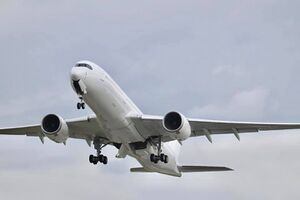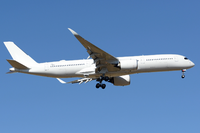Ahuriri Aerospace R540: Difference between revisions
(→R540) |
No edit summary |
||
| Line 15: | Line 15: | ||
|number built= X00 | |number built= X00 | ||
|primary user= [[Onekawa Skylines]] | |primary user= [[Onekawa Skylines]] | ||
|more users= [[Air Kermat]]<br>[[Royal Continental Airways]] | |more users= [[Air Kermat]]<br>[[Royal Continental Airways]]<br>[[Royal Redisan Airlines]] | ||
|status= In service | |status= In service | ||
|unit cost= | |unit cost= | ||
Revision as of 19:36, 20 December 2021
This article is incomplete because it is pending further input from participants, or it is a work-in-progress by one author. Please comment on this article's talk page to share your input, comments and questions. Note: To contribute to this article, you may need to seek help from the author(s) of this page. |

| |
| R540 on take for delivery to customer. | |
| Role | Wide-body jet airliner |
| Manufacturer | Ahuriri Aerospace |
| First flight | 2012 |
| Introduction | 10 June 2015 with Onekawa Skylines |
| Status | In service |
| Primary users | Onekawa Skylines Air Kermat Royal Continental Airways Royal Redisan Airlines |
| Produced | 2015 - present |
| Number built | X00 |
The Ahuriri Aerospace R540, also known as the "Globeliner" in a long-range twinjet wide-body passenger airliner produced by Ahuriri Aerospace''. Developed as part of the wider major product update that first saw the development of the R530 long-range medium capacity airliner, the R540 was intended as a replacement for the R520 for long range, high capacity routes whilst having more range and more versatility then its predecessor. . Reported by Ahuriri Aerospace as one of the most advanced airliners in the world, the first commercially produced aircraft was delivered to Onekawa Skylines in 2015 and has a back log of X00 orders as of 1 January 2021.
Development

The Catalogue Redevelopment Program, known colloquially as the "Latin Nose Planes" initiated by the recently minted President Hana Tuakeo called for a significant change across the Ahuriri Aerospace roster. It envisioned significantly more efficient, more versatile aircraft would dominate airliner demand in the foreseeable future and set out a three step change to its venerable fleet. The first new introduction would be the R530, intended to replace the R510 family due to the limitations on growth of the original R510 design.
The R540 would be the next step, and would see the replacement of the R520. The R520 had proven to be a reasonably popular aircraft with airlines, but its significant size and its quadjet configuration made it increasingly unpopular amongst passenger carrying customers as twinjets came to dominate the long-range widebody market with their improved efficiency. It also suffered from its size, as it was difficult to effectively employ on routes that had less demand. This coincided with the increasing use of the point-to-point model over or alongside the previous hub-and-spoke model amongst airlines.
Because of these concerns the R540 was designed mostly built from CFRP materials, significantly bring down the weight of the aircraft over traditional aircraft aluminum. This alongside the incorporation of the new Rollers Engineering Model 1400 turbofans designed exclusively for the R540 allowed for previously unmatched range and efficiency for a Ahuriri Aerospace widebody. With the R540ER having a range of 17,000km, it allows direct connections between distant destinations like Belfras to Ngati Onekawa-Nukanoa and allowed more direct trans-Makrian flights.